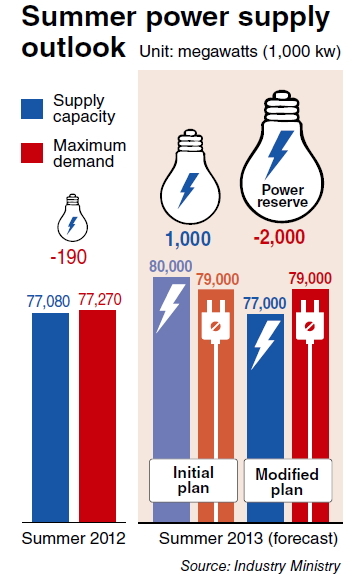Looming power shortage issue forces way onto national agenda
By Seo Jee-yeonPublished : May 29, 2013 - 20:34
The power shortage issue, triggered by the suspension of two nuclear reactors Tuesday due to the use of substandard components, is turning into a key national agenda as the country is expected to face the worst-ever summer electricity shortage this year.
The sudden shutdown of the Shin-Kori Reactor 2 in Busan and Shin-Wolsong Reactor 1 in North Gyeongsang Province brings the number of nuclear reactors out of action to 11, which raises a severe power shortage issue.

Korea currently runs 23 reactors, generating 30 percent of the nation’s total electricity generation.
“The 10 suspended reactors make up about 10 percent of the nation’s total power generation capacity,’’ an official from the Korea Electric Power Corp. said.
Considering the fact that Korea maintains a 5 to 10 percent reserve power rate and it takes three to six months for a change of parts or for a regular check-up, the power loss due to stoppage of multiple reactors at the same time could cause a blackout in the summer peak season.
Trade, Industry and Energy Vice Minister Han Jin-hyun, who is responsible for the nation’s energy policy, recently warned against a possible unprecedented supply shortage when the summer heat peaks in August.
In the course of developing measures to cope with a power crisis, Hyun visited the National Assembly on Wednesday to explain of measures to prevent a possible power outage during the summer.
Following a regular policy coordination meeting among ministries slated for Friday, Prime Minister Chung Hong-won is to make a public announcement on how serious the power shortage issue will be and request citizens to join the upcoming power saving campaign, the Office for Government Policy Coordination said.
Industry watchers predicted the government will launch a large-scale power saving campaign nationwide, while asking corporations to cut power consumption.
“There is no means to significantly boost our generation capacity in a short period of time. We have no choice but to manage power demand to avoid a possible power crisis,’’ Han said.
The ministry forecast power demand is expected to go up to 79,000 megawatts this year, up from 77,270 megawatts last year.
Meanwhile, with the shutdown of the reactors, the nation’s total power generation capacity is expected to drop to about 77,000 megawatts. Therefore, the government has to cut more than 20,000 megawatts in power consumption this summer.
By Seo Jee-yeon (jyseo@heraldcorp.com)
The sudden shutdown of the Shin-Kori Reactor 2 in Busan and Shin-Wolsong Reactor 1 in North Gyeongsang Province brings the number of nuclear reactors out of action to 11, which raises a severe power shortage issue.

Korea currently runs 23 reactors, generating 30 percent of the nation’s total electricity generation.
“The 10 suspended reactors make up about 10 percent of the nation’s total power generation capacity,’’ an official from the Korea Electric Power Corp. said.
Considering the fact that Korea maintains a 5 to 10 percent reserve power rate and it takes three to six months for a change of parts or for a regular check-up, the power loss due to stoppage of multiple reactors at the same time could cause a blackout in the summer peak season.
Trade, Industry and Energy Vice Minister Han Jin-hyun, who is responsible for the nation’s energy policy, recently warned against a possible unprecedented supply shortage when the summer heat peaks in August.
In the course of developing measures to cope with a power crisis, Hyun visited the National Assembly on Wednesday to explain of measures to prevent a possible power outage during the summer.
Following a regular policy coordination meeting among ministries slated for Friday, Prime Minister Chung Hong-won is to make a public announcement on how serious the power shortage issue will be and request citizens to join the upcoming power saving campaign, the Office for Government Policy Coordination said.
Industry watchers predicted the government will launch a large-scale power saving campaign nationwide, while asking corporations to cut power consumption.
“There is no means to significantly boost our generation capacity in a short period of time. We have no choice but to manage power demand to avoid a possible power crisis,’’ Han said.
The ministry forecast power demand is expected to go up to 79,000 megawatts this year, up from 77,270 megawatts last year.
Meanwhile, with the shutdown of the reactors, the nation’s total power generation capacity is expected to drop to about 77,000 megawatts. Therefore, the government has to cut more than 20,000 megawatts in power consumption this summer.
By Seo Jee-yeon (jyseo@heraldcorp.com)


















